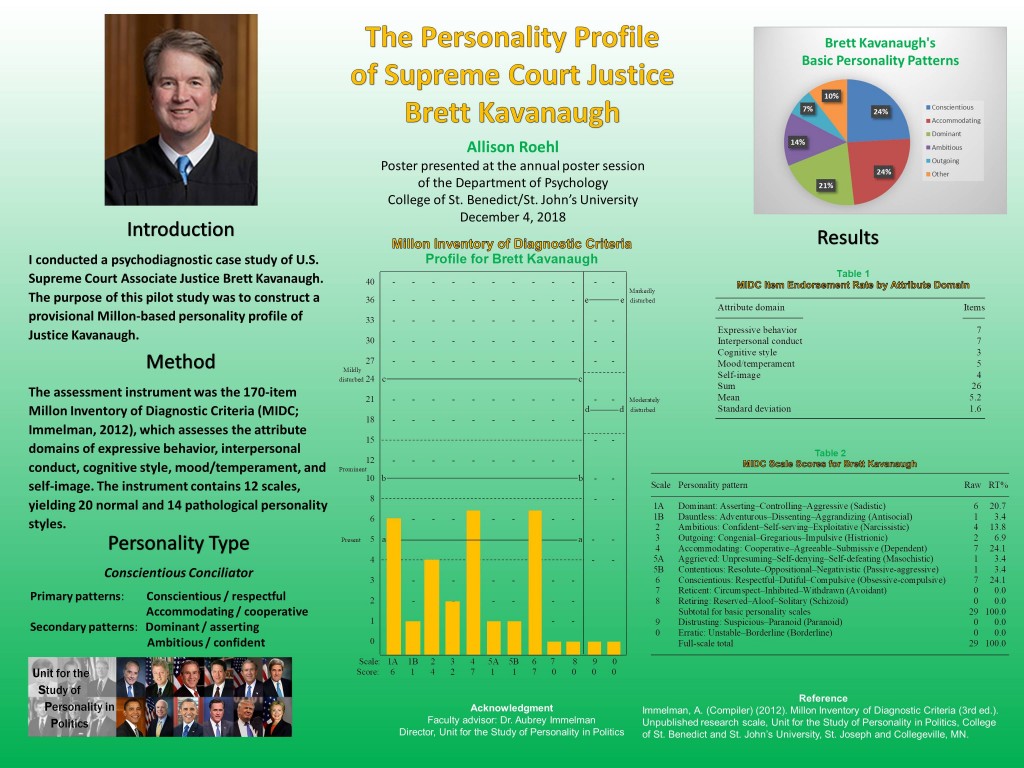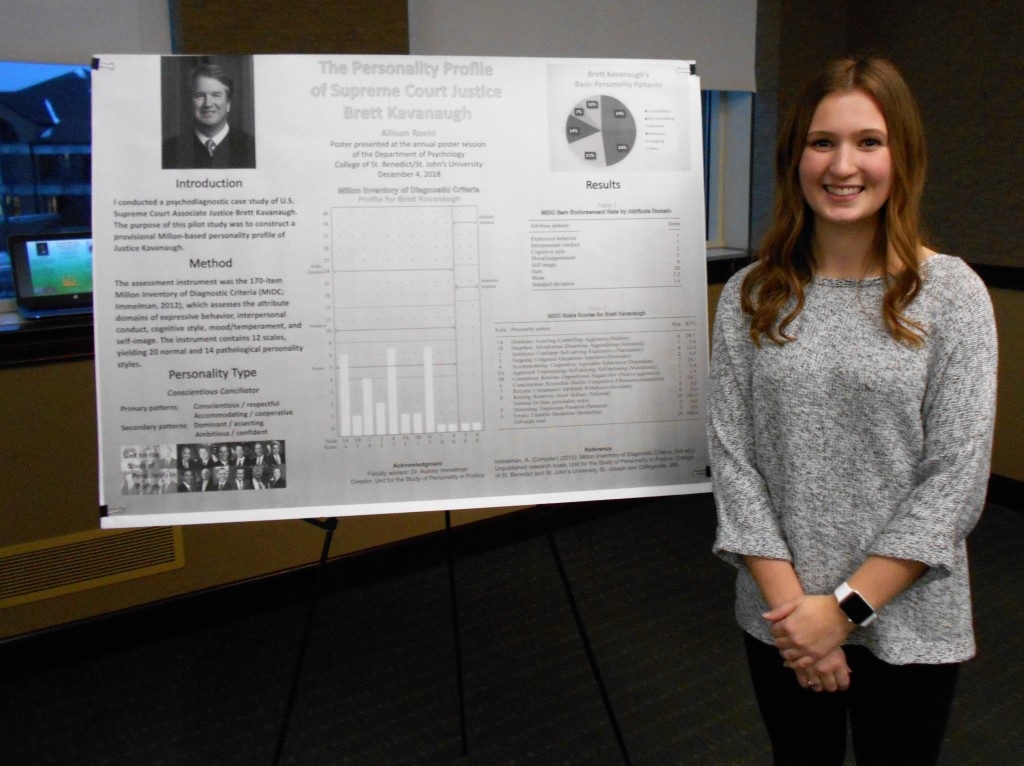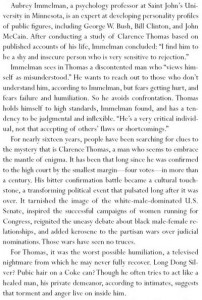Featured Posts

- Index of Psychological Studies of Presidents and Other Leaders Conducted at the Unit for the Study of Personality in Politics
- The Personality Profile of U.S. Supreme Court Associate Justice Brett Kavanaugh
- The Leadership Style of North Korean Leader Kim Jong-un
- North Korea Threat Assessment: The Psychological Profile of Kim Jong-un
- Russia Threat Assessment: Psychological Profile of Vladimir Putin
- The Personality Profile of 2016 Republican Presidential Candidate Donald Trump
- Donald Trump's Narcissism Is Not the Main Issue
- New Website on the Psychology of Politics
- Unit for the Study of Personality in Politics --- 'Media Tipsheet'
categories

- Afghanistan (228)
- Al Gore (2)
- Amy Klobuchar (4)
- Ayman al-Zawahiri (7)
- Barack Obama (60)
- Ben Carson (2)
- Bernie Sanders (7)
- Beto O'Rourke (3)
- Bill Clinton (4)
- Bob Dole (2)
- Campaign log (109)
- Chris Christie (2)
- Chuck Hagel (7)
- Criminal profiles (8)
- Dick Cheney (11)
- Domestic resistance movements (21)
- Donald Trump (31)
- Economy (33)
- Elizabeth Warren (4)
- Environment (24)
- George H. W. Bush (1)
- George W. Bush (21)
- Hillary Clinton (9)
- Immigration (39)
- Iran (43)
- Iraq (258)
- Jeb Bush (3)
- Joe Biden (13)
- John Edwards (2)
- John Kasich (2)
- John Kerry (1)
- John McCain (7)
- Kamala Harris (5)
- Kim Jong-il (3)
- Kim Jong-un (11)
- Law enforcement (25)
- Libya (18)
- Mahmoud Ahmadinejad (6)
- Marco Rubio (2)
- Michael Bloomberg (1)
- Michele Bachmann (173)
- Mike Pence (3)
- Military casualties (234)
- Missing person cases (37)
- Mitt Romney (13)
- Muqtada al-Sadr (10)
- Muslim Brotherhood (6)
- National security (16)
- Nelson Mandela (4)
- News (5)
- North Korea (36)
- Osama bin Laden (19)
- Pakistan (49)
- Personal log (25)
- Pete Buttigieg (4)
- Presidential candidates (19)
- Religious persecution (11)
- Rick Perry (3)
- Rick Santorum (2)
- Robert Mugabe (2)
- Rudy Giuliani (4)
- Russia (7)
- Sarah Palin (7)
- Scott Walker (2)
- Somalia (20)
- Supreme Court (4)
- Syria (5)
- Ted Cruz (4)
- Terrorism (65)
- Tim Pawlenty (8)
- Tom Horner (14)
- Tributes (40)
- Uncategorized (50)
- Vladimir Putin (4)
- Xi Jinping (2)
- Yemen (24)
Links

archives

- November 2021
- January 2021
- November 2020
- October 2020
- September 2020
- August 2020
- July 2020
- April 2020
- March 2020
- February 2020
- January 2020
- December 2019
- October 2019
- July 2019
- May 2019
- April 2019
- March 2019
- February 2019
- January 2019
- December 2018
- September 2018
- August 2018
- July 2018
- June 2018
- April 2018
- March 2018
- February 2018
- January 2018
- August 2017
- July 2017
- June 2017
- May 2017
- April 2017
- February 2017
- January 2017
- December 2016
- November 2016
- October 2016
- September 2016
- August 2016
- July 2016
- June 2016
- May 2016
- April 2016
- March 2016
- February 2016
- January 2016
- December 2015
- November 2015
- October 2015
- September 2015
- August 2015
- July 2015
- June 2015
- May 2015
- April 2015
- March 2015
- February 2015
- January 2015
- December 2014
- November 2014
- October 2014
- September 2014
- August 2014
- July 2014
- June 2014
- May 2014
- April 2014
- March 2014
- February 2014
- January 2014
- December 2013
- November 2013
- October 2013
- September 2013
- August 2013
- July 2013
- June 2013
- May 2013
- April 2013
- March 2013
- February 2013
- January 2013
- December 2012
- November 2012
- October 2012
- September 2012
- August 2012
- July 2012
- June 2012
- May 2012
- April 2012
- March 2012
- February 2012
- January 2012
- December 2011
- November 2011
- October 2011
- September 2011
- August 2011
- July 2011
- June 2011
- May 2011
- April 2011
- March 2011
- February 2011
- January 2011
- December 2010
- November 2010
- October 2010
- September 2010
- August 2010
- July 2010
- June 2010
- May 2010
- April 2010
- March 2010
- February 2010
- January 2010
- December 2009
- November 2009
- October 2009
- September 2009
- August 2009
- July 2009
- June 2009
- May 2009
- April 2009
- March 2009
- February 2009
- January 2009
- December 2008
- November 2008
- October 2008
- September 2008
- August 2008
- July 2008
meta

A psychological analysis of United States Supreme Court associate justice Brett Kavanaugh by Allison Roehl and Aubrey Immelman, Ph.D., at the Unit for the Study of Personality in Politics, revealed that Kavanaugh’s primary personality patterns are Conscientious/respectful and Accommodating/cooperative, with secondary Dominant/asserting and Ambitious/confident features. In summary, Justice Kavanaugh’s personality composite can be characterized as that of a conscientious conciliator.

Click on image for larger view
Conscientious (scale 6) individuals are characteristically principled, prudent, proper, dignified, and dependable; they are dutiful and diligent, with a strong work ethic and careful attention to detail. Accommodating (scale 4) individuals are cordial, cooperative, and amicable; they are polite, respectful, and agreeable, willing to adapt their preferences to reconcile differences, and to concede or compromise when necessary. Dominant (scale 1A) individuals enjoy the power to direct others and to evoke obedience and respect; they can be tough and unsentimental and often are effective in positions of authority. Ambitious (scale 2) individuals are bold, competitive, and self-assured; they easily assume leadership roles, expect others to recognize their special qualities, and may act as though entitled.
The Conscientious–Accommodating (Scale 6–4) composite pattern
Individuals with a predominantly Conscientious (scale 6) personality pattern who also possess significant Accommodating (scale 4) features may be characterized as conscientious conciliators. The Conscientious–Accommodating blend is the most well-adjusted of all Conscientious personality variants. These personalities are earnest, hardworking, meticulous, play by the rules, and are duty-bound. The most prevalent limitation of this personality amalgam is a tendency to be inflexible and indecisive, with an unwarranted fear of failure or error; hence, they tend to be risk-averse and are typically more submissive (socially agreeable) than dominant.
Formulation
This indirect, at-a-distance personality assessment cannot be construed as disconfirming or confirming the sexual assault allegations dating back decades that Dr. Christine Blasey Ford leveled against Justice Brett Kavanaugh during his Senate confirmation hearings; those allegations must be evaluated on their own merits. It may, however, legitimately be asserted that the personality profile is inconsistent with that of a person who would exhibit a pattern of sexual misconduct (or any kind of habitual criminal or antisocial behavior). Finally, the profile cannot exclude the possibility that a teenage Brett Kavanaugh — irrespective of his enduring personality pattern — could have committed a sexual indiscretion on occasion when his judgment was impaired by alcohol intoxication.

Allison Roehl presents her research poster, “The Personality Profile of Supreme Court Justice Brett Kavanaugh,†at the annual Department of Psychology Poster Session, College of St. Benedict | St. John’s University, Dec. 4, 2018.
PowerPoint presentation
The Personality Profile of Supreme Court Justice Brett Kavanaugh

Related reports on this site
Christine Blasey Ford’s Sexual Assault Allegation Against Supreme Court Nominee Brett Kavanaugh (Sept. 27, 2018)
The expert witness best qualified to comment on the accuracy and reliability of Dr. Christine Blasey Ford’s memory of a sexual assault approximately 36 years ago is Dr. Elizabeth Loftus, distinguished professor in the Department of Psychology and Social Behavior and the Department of Criminology, Law, and Society at the University of California, Irvine, with additional appointments in the university’s Department of Cognitive Sciences and the Center for the Neurobiology of Learning and Memory.

“The real question in this case … is not whether this happened so much. But who actually did it. Because everything I’ve seen in the discussions of this case, one of the things I want to know is when did she attach the name Brett Kavanaugh to the episode that she is recounting from when she was 15 years old. And I wish somebody would ask that question because I think the answer to that question is pretty crucial.â€
– Elizabeth Loftus (“Anderson Cooper 360°,†CNN, September 19, 2018)
The Personality Profile of United States Supreme Court Justice Clarence Thomas (Jan. 30, 2017)
More than a decade after the study was conducted, the Unit for the Study of Personality in Politics has publicly released its personality profile of U.S. Supreme Court associate justice Clarence Thomas. The report was prepared for the Washington Post’s Kevin Merida as part of the background research for his book, with Michael Fletcher, Supreme Discomfort: The Divided Soul of Clarence Thomas (2007).
The Personality of U.S. Supreme Court Justice Clarence Thomas. Research report, Unit for the Study of Personality in Politics, St. John’s University/College of St. Benedict, July 2004. Abstract and link for full-text (22 pages; PDF) download at Digital Commons: http://digitalcommons.csbsju.edu/psychology_pubs/108/
Leave a Reply
You must be logged in to post a comment.




December 20th, 2018 at 2:16 am
[…] The Personality Profile of U.S. Supreme Court Associate Justice Brett Kavanaugh (Dec. 5, 2018) […]